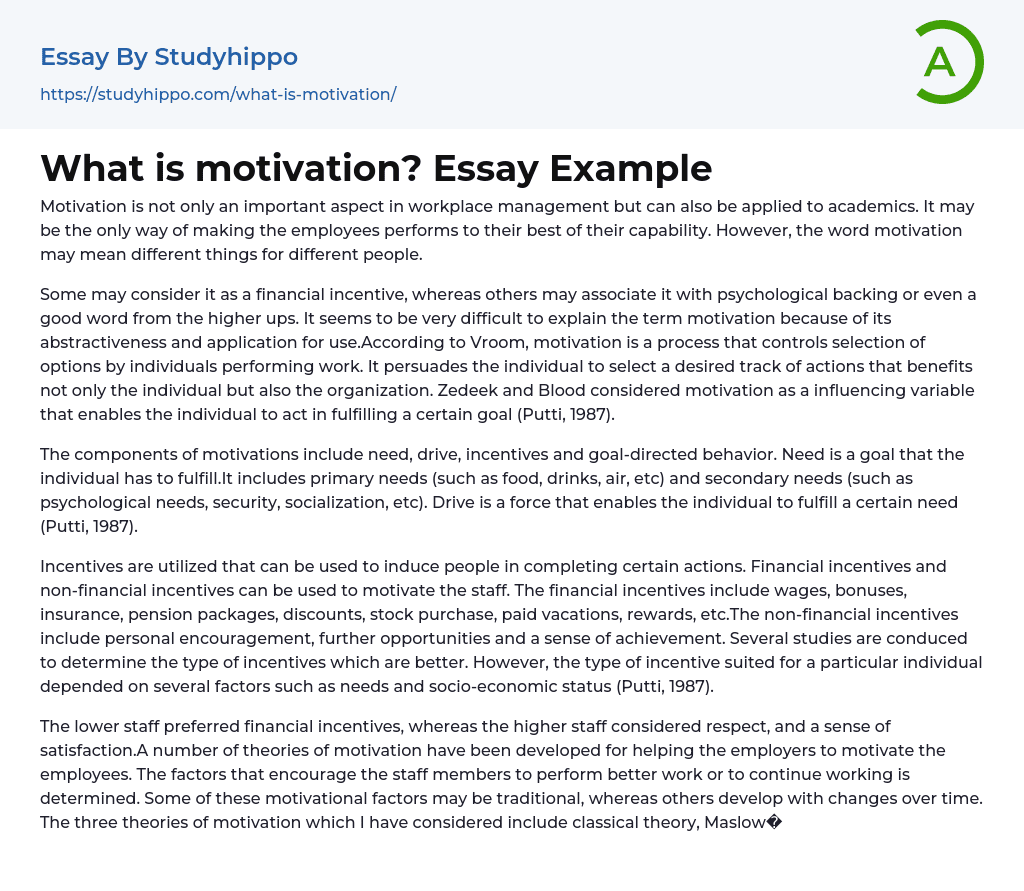Motivation is crucial not just in workplace management but also in academics, as it can enable employees to perform to their maximum potential. Nevertheless, the definition of motivation may vary among individuals.
Explaining the term motivation can be difficult due to its abstractness and range of applications. Some view it as a financial incentive, while others see it as psychological support or even recognition from superiors. Vroom defined motivation as a process for controlling an individual's work options, urging the person to choose actions that benefit the individual and the organization. Zedeek and Blood saw motivation as a variable that influences an individual's actions towards achieving specific goals (Putti, 1987).
Putti (1987) identified the motivational components as the fulfillment of goals via need, drive, incentives, and goal-directed behavior. Primary needs such as food, drinks, and air are essential while secondary needs encompass psychological
...needs, security, and socialization. Individuals use drive to satisfy a specific requirement.
There are different techniques employed to inspire people for particular duties, such as providing rewards. Such motivation can be either financial or non-financial in character. Financial incentives involve an assortment of advantages like salaries, bonuses, markdowns, stock purchase alternatives, insurance coverage, pension schemes, paid time off and prizes. Non-financial incentives encompass personal drive and prospects for development that generate a sense of achievement. Several investigations have been carried out to ascertain the most successful form of incentive; nevertheless, its optimal format differs based on personal requirements and socioeconomic status (Putti, 1987).
The financial incentives were favored by the lower staff, while the higher staff prioritized respect and a sense of satisfaction. Various theories of motivation have been developed to aid employers i
motivating their employees and determining the factors that encourage better work or continued employment. Some motivational factors are traditional, while others evolve over time. The three theories of motivation discussed are classical theory, Maslow's Hierarchy, and Vroom's Preference-Expectancy theory.
- American Dream essays
- Barriers To Entry essays
- Capitalism essays
- Central Bank essays
- Compensation essays
- Consumerism essays
- Economic Development essays
- Economic Growth essays
- Economic Inequality essays
- Economic System essays
- Economy essays
- Employment essays
- Export essays
- Finance essays
- Free Trade essays
- Gross Domestic Product essays
- Human Development essays
- Income Inequality essays
- Industry essays
- Inflation essays
- International Business essays
- International Trade essays
- Macroeconomics essays
- Materialism essays
- Max Weber essays
- Microeconomics essays
- Minimum Wage essays
- Monetary Policy essays
- Monopoly essays
- Pricing essays
- Profit essays
- Recession essays
- resources essays
- Taxation essays
- Trade essays
- Unemployment essays
- Warehouse essays
- World economy essays
- Incentive essays
- Bias essays
- Big Five Personality Traits essays
- Body Image essays
- Mind essays
- Motivation essays
- Phobias essays
- Thought essays




